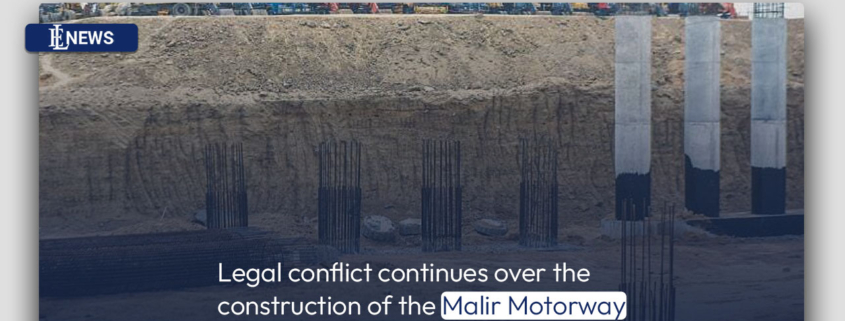Legal conflict continues over the construction of the Malir Motorway
KARACHI: Residents have challenged the Environmental Protection Tribunal’s verdict in the Sindh High Court despite the rapid construction of the Malir Motorway.
Read more with EL news: KP’s Mansehra bridge floods, stranding travelers
The appellants requested that the SHC declare the controversial project to be detrimental to the environment and halt its construction pending the outcome of their appeal, while the construction company, M/s Malir Motorway Limited, argued that a substantial amount of public funds had already been spent on the project, which aimed to improve connectivity within the provincial metropolis.
On April 15, a three-member tribunal allowed authorities to continue construction on the controversial project in the public’s best interest, but ruled that the approval of the project’s Environmental Impact Assessment (EIA) was conditional and subject to the implementation of approximately 30 conditions, including the risk of urban flooding, the acquisition of land in a transparent manner, and the redress of the grievances of affected individuals.
In the EIA approval, the project in issue is described as a 38.75-kilometer six-lane dual carriageway that will provide a direct route for heavy vehicles from the industrial areas of Korangi and Landhi to the city’s outskirts.
The EIA approval also stated that the project would begin just before the Jam Sadiq bridge on Korangi Road, travel along the right bank of the Malir River through the Korangi and Malir districts, and end on the M-9 near DHA City outside of Karachi.
Ahmed Shabbar, one of the two Karachi residents who had petitioned the tribunal against the approval of the EIA, had his attorney, Zubair Abro, file an appeal with the SHC in May, challenging the tribunal’s April 15 ruling.
Citing the Sindh Environmental Protection Agency and Malir Motorway Limited as respondents, the appellant argued that the tribunal failed to adhere to the principles established by the supreme court in the case of architect Arif Belgaumi and in other cases.
The counsel for the appellant argued that the tribunal was also incapable of appreciating the contested approval of the EIA by the deputy director, who lacked the legal authority to do so, while the tribunal found it to be a mere technical, correctable, and procedural flaw.
However, the attorney argued that it was part of a series of acts and omissions designed to evade regulatory process and circumvent public scrutiny. These included starting work before the EIA hearing, aligning the motorway without prior legal authority, and changing the company during the most crucial stages of the project’s launch, as Malir Motorway Private had submitted the public notice but Malir Motorway Limited was granted approval.
In addition, he claimed that the court had erroneously accepted ex post facto environmental approval and the compounding of violations of mandatory legal provisions.
The attorney argued that the Asian Development Bank was one of the main financiers of the project, and that through a letter, it had agreed with the concerns of the appellant and other residents and withdrawn its support for the endeavour.
In addition, he argued that some complainants had submitted to the ADB that even the EIA reports had two versions, one of which was made available to the public before the 9 March 2022 hearing and the other of which was published to the ADB website in June 2022.
Mr. Abro also argued that the tribunal failed to recognise that the challenged EIA sanction was granted without consultation with the advisory committee that was required to be established under Section 5(6) of the Sindh Environmental Protection Act, 2014.
Regarding the conditions imposed by the tribunal, the attorney argued that they were merely cosmetic and set without realising the situation on the ground, as the project had begun well before EIA approval was granted and Sepa had issued a notice for a personal hearing to the project’s proponent in this regard. Another condition required three rows of plantation on each side of the motorway, despite the fact that the project was in the Malir River.
The appellant asked the SHC to vacate the challenged approval of the EIA granted on April 6, 2022, and the second approval granted on June 10, 2022, on the grounds that they lacked authority, declare the project to be environmentally harmful, and issue a temporary restraining order to halt construction.
Malir Motorway Limited argued in its response that the appeal was inadmissible because the appellant was not an aggrieved party, the appeal before the tribunal was time-barred, and the appellants failed to challenge the second approval of the EIA before the appropriate forum.
The EIA of the project was initially granted in April, and the approval was subsequently reaffirmed by Sepa and issued again in June under the signatures of Sepa’s director general, according to the document, which also noted that significant construction work had already been completed and that a significant amount of public funds were also utilised for the project.
While supporting the result/decision of the tribunal, the firm undertaking the project contested several of the tribunal’s findings, including appellants’ right to approach the tribunal, first approval of EIA being appealable, appeal before the tribunal not being time-barred, and the EIA approval of the project being deemed controversial.
In its comments, the company also asserted that the appellant, in an effort to strengthen his case, had raised new factual allegations in this appeal that had not been raised in the appeal before the tribunal.
It also argued that the ADB had sent a letter to one Abira and not the appellant, that the bank did not share the appellant’s concerns, and that since there was no financing commitment from the ADB, there was no possibility of withdrawing funding for the project.
A single-judge division of the Supreme Court of Pakistan led by Justice Salahuddin Panhwar adjourned the hearing until August 10.



